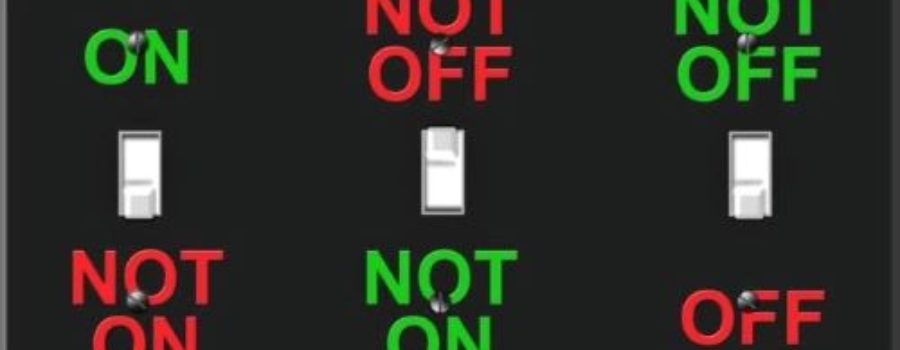Our circumstances have provided a tremendous opportunity to re-define how we work with each other.
Some legacy workplace notions are likely to be tested. For example, some leaders must “see” a person sitting in a chair in an office otherwise they think that person isn’t working. Relationship and trust boundaries are likely to be re-defined as we work with a more distributed workforce.
The Tale of “The Under-Cabinet Light Fixture”
We needed to replace some under-cabinet light fixtures in the kitchen. And given our recent circumstances with COVID, we had some time to do this project. While I am not a super handyman, doing the replacement looked pretty straightforward.
Having replaced fixtures of this nature in the past, I followed a logical Mr. Fixit plan:
-
-
-
- Thought safety first (i.e., make certain the main power is off)
- Studied the instructions thoroughly before attempting the installation
- Made sure that all the appropriate tools were readily accessible
- And of course, viewed the most recent YouTube videos
-
-
Things were going along splendidly. The main power breaker was off – check. The refrigerator would only be off for a limited amount of time – check. The clocks would all need to be reset but that was no big deal – check.
I was ensuring that everything was wired correctly, hot-to-hot, ground-to-ground etc. There was really only one way this could be directly wired, and I knew it was done correctly. OK, now it was time to set the fixture and replace the lens. Bravo spike the football!
Confidently striding to the main circuit box I engaged the main and yelled up the stairs, “is it working?” Well the good news was that the refrigerator was back on, but the new lighting wasn’t. I checked the switch on the fixture itself and nothing.
So, I went back down the stairs to the circuit breaker and turned off the power again. Then I came back up and took the light apart again to re-check the wiring. It was wired correctly but still not illuminating.
My wife and I have always been an awesome partnership. We trust each other’s judgment and have complementary talents and abilities. Jane has savvy, persistence, and intelligence. As many of you can relate, we run into situations where we may not always agree on the desired course of action to achieve our desired outcome.
When the fixture did not illuminate, she diplomatically asked if it was time to call the Electrician “so we don’t burn the house down.” I reluctantly conceded that it might be time to call someone else. We arranged for an electrician to arrive first thing Monday morning.
Now it was time for a quick after action review. Why didn’t this work?
I racked my brain for a solution knowing that it was wired correctly and yet it was not performing as expected. And of course that did very little to boost my credibility as Mr. Fixit.
What was missing?
The fixture was left in a state of dangling semi-installation. Each time I walked into the kitchen I could not help try the button on the fixture. No dice.
Then it hit me. There was another switch on the wall under the cabinet (actually 4 total plates, each with 2 switches). While it didn’t seem obvious at first, the correct switch was right under my nose. Jane hadn’t noticed I was reaching for the first one rather than the second because I was standing in front of her. Now in hindsight, it was obvious and in plain sight. Could that be the issue?
Flipping the switch, the new LED fixture gloriously blazed forth with unbridled avarice. It was indescribably beautiful, like the fourth of July! (Yes, I spun the football right there on the kitchen floor!)
Lessons from the light fixture:
The Moral of the Story is: Don’t overlook the obvious.
While this was a small situation at home, I have seen similar situations in the workplace. How often do leaders get bogged down with minutiae when the people around them just need someone to simply pay attention to what is going on in their world?
-
-
-
- Are leaders overlooking something obvious and in plain sight?
- Is the team wired the right way for the circumstances?
- Are they “properly grounded” and lighting things up?
- Is there a legitimate need for outside help?
-
-
If you replace “W” with “T” in “What, Where and When” you get the answer to each of them (that, there and then). Our circumstances have provided a tremendous opportunity to re-define how we work with each other.
Again, some legacy workplace notions are likely to be tested. For example, some leaders must “see” a person sitting in a chair in an office otherwise they think that person isn’t working. Relationship and trust boundaries are likely to be re-defined as we work with a more distributed workforce.
The confluence of economic and political interests has reached a tipping point as we exit the COVID-19 situation. It is time to install business 2.0, flip the switch and turn the power back on.
Keep walking towards the light!



